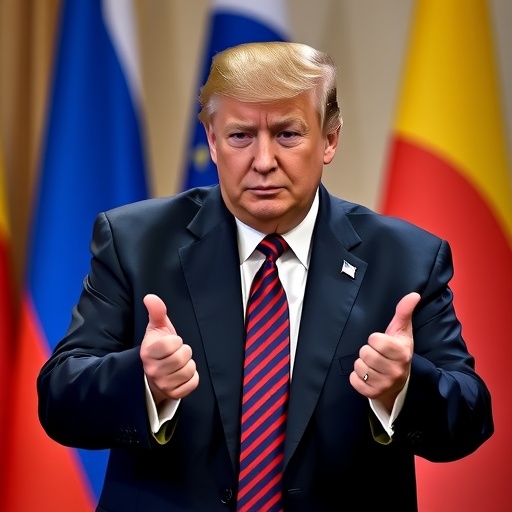Donald Trump Seeks China’s Help in Brokering Russia Peace Deal Amid Escalating Ukraine War Tensions
In a surprising diplomatic pivot that could reshape global alliances, former President Donald Trump has publicly urged China to intervene and help broker a peace deal with Russia over the devastating Ukraine war. Speaking at a high-profile rally in Florida, Trump declared that Beijing’s influence over Moscow makes it the ideal mediator, as U.S. sanctions and military aid to Kyiv intensify the pressure on the Kremlin. This bold call comes at a time when the conflict, now in its third year, has claimed over 500,000 lives and displaced millions, according to United Nations estimates.
- Trump’s Diplomatic Gamble: Leveraging China’s Ties with Russia
- Heightened U.S. Pressure on Moscow Fuels Urgency for a Peace Deal
- Beijing’s Reluctant Role: Balancing Neutrality and Global Influence
- Global Reactions and the Shadow of Geopolitical Realignment
- Path Forward: Challenges and Opportunities in Pursuit of Peace
Trump’s announcement, delivered with his signature flair, underscores a potential shift in U.S. strategy toward multilateral engagement with authoritarian powers. “China has the leverage with Russia that no one else does,” Trump stated to thunderous applause. “It’s time for President Xi to step up and end this madness before it drags the world into deeper chaos.” The proposal has sparked immediate debate, with supporters hailing it as pragmatic realpolitik and critics decrying it as a naive concession to Beijing’s growing ambitions.
Trump’s Diplomatic Gamble: Leveraging China’s Ties with Russia
Donald Trump‘s outreach to China is rooted in the intricate web of Sino-Russian relations that have deepened since the invasion of Ukraine in February 2022. Beijing has maintained a delicate neutrality, abstaining from UN votes condemning Russia while providing economic lifelines through increased trade. In 2023 alone, bilateral trade between the two nations surged to $240 billion, up 26% from the previous year, according to China’s General Administration of Customs. This economic interdependence gives Xi Jinping unique sway over Vladimir Putin, something Trump appears eager to exploit.
During his presidency, Trump cultivated a personal rapport with both leaders, often touting his “art of the deal” approach to foreign policy. Now, out of office but influential within Republican circles, he envisions a trilateral summit where China could pressure Russia to withdraw from occupied territories in exchange for eased sanctions and normalized relations with the West. “I’ve talked to Putin; I’ve talked to Xi. They respect strength, and this is strength—bringing them to the table,” Trump elaborated in an exclusive interview with Fox News following the rally.
Experts note that this strategy echoes historical precedents, such as China’s role in the 1970s détente between the U.S. and Soviet Union. Dr. Elena Petrova, a senior fellow at the Brookings Institution, commented, “Trump’s proposal is audacious but not unfounded. China has repeatedly called for dialogue in the Ukraine war, positioning itself as a peacemaker to counter Western narratives.” However, she cautioned that Beijing’s priorities—protecting its Belt and Road investments in Europe and avoiding entanglement in NATO’s orbit—might limit its enthusiasm.
Heightened U.S. Pressure on Moscow Fuels Urgency for a Peace Deal
As Donald Trump pushes for China‘s involvement, the Biden administration’s escalation of support for Ukraine has ratcheted up the stakes in the Ukraine war. Last week, the U.S. approved a $61 billion aid package, including advanced ATACMS missiles capable of striking deep into Russian-held territory. This move prompted Putin to warn of “asymmetric responses,” including potential nuclear saber-rattling, heightening fears of broader conflict.
The Ukraine war has exacted a staggering toll: Ukrainian forces report over 100,000 soldiers killed or wounded, while independent analysts from the Oryx project have verified more than 3,000 Russian tanks destroyed. Economically, Russia‘s GDP contracted by 2.1% in 2023 despite wartime spending, per IMF data, with inflation hovering at 7.4%. These pressures, combined with internal dissent—evidenced by the 2023 Wagner Group mutiny—could make Moscow more amenable to negotiations if China applies the right incentives.
Trump’s camp argues that involving Beijing could accelerate a peace deal by addressing Russia’s core demands, such as Ukraine’s neutrality and security guarantees against NATO expansion. In a policy paper circulated among GOP lawmakers, Trump allies outlined a framework: Russian troop withdrawal from Kherson and Zaporizhzhia oblasts in phase one, followed by international monitoring and economic reconstruction aid funneled through China-led initiatives. “This isn’t appeasement; it’s smart diplomacy,” said former National Security Advisor Robert O’Brien, who advised Trump on the plan.
Yet, challenges abound. Kyiv has rejected any deal that cedes territory, with President Volodymyr Zelenskyy stating, “Peace must be just, not dictated by aggressors.” The U.S. State Department, while not directly responding to Trump’s overture, emphasized its commitment to bilateral talks excluding Russia‘s enablers like China.
Beijing’s Reluctant Role: Balancing Neutrality and Global Influence
China‘s potential as a broker in the Ukraine war hinges on its strategic calculus. Since the conflict began, Beijing has positioned itself as a voice of reason, proposing a 12-point peace plan in February 2023 that called for respecting sovereignty while urging an immediate ceasefire. That plan, though dismissed by the West as pro-Russian, garnered support from Global South nations wary of U.S. hegemony.
Trump’s appeal taps into China‘s desire to burnish its image as a responsible superpower. Foreign Minister Wang Yi recently reiterated Beijing’s willingness to mediate, telling the UN General Assembly, “China stands ready to play a constructive role in resolving hot-spot issues.” Domestically, state media like Xinhua has amplified narratives of Western aggression in Ukraine, aligning with Russia‘s propaganda while avoiding direct military aid.
However, risks loom large. Aligning too closely with a peace deal could strain China‘s relations with Europe, its largest trading partner, which has imposed sanctions on Moscow and Beijing’s dual-use exports. A report by the Center for Strategic and International Studies estimates that China has supplied over $100 million in components for Russian drones since 2022, drawing EU scrutiny. “Xi Jinping won’t jeopardize economic ties for an uncertain diplomatic win,” opined analyst Yun Sun from the Stimson Center.
In private discussions, Trump has reportedly reached out to Chinese intermediaries via business channels, leveraging his pre-presidency real estate ties in Asia. Sources close to the matter indicate that a backchannel conversation with Xi could occur at the upcoming APEC summit in Peru, where Donald Trump plans to send representatives.
Global Reactions and the Shadow of Geopolitical Realignment
The international community has responded to Donald Trump‘s peace deal proposal with a mix of intrigue and skepticism. NATO Secretary General Jens Stoltenberg called it “a long shot,” emphasizing that any talks must prioritize Ukraine’s territorial integrity. In contrast, Hungarian Prime Minister Viktor Orbán, a Trump ally, praised the idea as “a path to de-escalation,” reflecting fissures within the alliance.
In Moscow, the Kremlin downplayed the overture but didn’t dismiss it outright. Spokesman Dmitry Peskov noted, “We welcome all sincere efforts for peace, but only on equal terms.” This measured tone suggests Putin might be testing the waters, especially as Russia‘s summer offensive in Donbas stalls amid Ukrainian counterstrikes using Western-supplied F-16 jets.
India and Brazil, key BRICS members, have echoed calls for inclusive dialogue, with Brazilian President Lula da Silva offering to co-host talks. This could expand the forum beyond China and Russia, incorporating diverse perspectives to legitimize any agreement. Meanwhile, U.S. Democrats, including Senate Foreign Relations Committee Chair Ben Cardin, criticized Trump’s approach as undermining Biden’s strategy, accusing him of “playing footsie with dictators.”
The proposal also intersects with broader U.S.-China tensions, including trade wars and Taiwan Strait flare-ups. A successful mediation could thaw relations, potentially averting a new Cold War divide. As one Pentagon official put it anonymously, “If Trump pulls this off, it redefines American diplomacy for the 21st century.”
Path Forward: Challenges and Opportunities in Pursuit of Peace
Looking ahead, Trump’s push for China to broker a peace deal with Russia faces formidable hurdles, but it opens doors to innovative conflict resolution. The first step involves discreet envoy exchanges, possibly through the UN or neutral venues like Istanbul, where preliminary talks occurred in 2022. Success would require concessions: Ukraine halting NATO aspirations, Russia demilitarizing the border, and China committing to reconstruction funds estimated at $500 billion by the World Bank.
Optimists point to precedents like the 1995 Dayton Accords, brokered by the U.S. in Bosnia. If realized, a peace deal could stabilize energy markets—Russia‘s war has driven global oil prices to $90 per barrel—and refocus attention on shared threats like climate change. Yet, failure risks emboldening hardliners on all sides, prolonging the Ukraine war and eroding trust in multilateralism.
As Donald Trump continues to shape the narrative from the campaign trail, his initiative underscores a yearning for resolution amid war fatigue. With winter approaching and humanitarian needs mounting—over 10 million Ukrainians face food insecurity, per the UN—the world watches closely. Whether this diplomatic gambit bears fruit or fades into rhetoric, it signals a pivotal moment in the Ukraine war, where unlikely bedfellows might yet forge peace.








